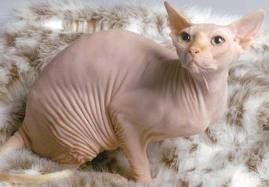I'm sure we've all seen fur sprouting in some strange places--like humans with bear bottoms or bearfeet.
Some homophone errors are, frankly, more troublesome than others.
Today we'll learn to distinguish two fraternal twins in English, the homophones bare and bear, looking first at definitions and use within sentences, then providing some mnemonics to help you keep them straight.
bare (adj.): lacking a natural or usual covering, lacking clothing, naked; lacking a tool or weapon; open to view, exposed; scantily supplied, destitute; having nothing left over or added; devoid of amplification or adornment
Examples:
I wouldn't want to walk on hot coals with bare feet.
The baby ripped off her diaper and ran bare-bottomed.
Susan had to kill the mouse with her bare hands.
The reporter laid bare their secrets.
Detective Smitherson searched the bare room for clues.
Those homeless families lack the bare necessities to live.
Ken was stunned by the bare facts of the case.
bare (v, trans.): bared, baring
to expose, make naked, uncover.
Examples:
Desmond wanted to bare himself, body and soul, to his beloved Ekaterina.
Do you dare to bare your figure this swimsuit season?
Mnemonics: You ARE BARE if you have no hair.
You ARE BARE naked under your clothes.

bear (n) a large, shaggy mammal (family Ursidae) with a rudimentary tail and paws that eats primarily plants, fruits and insects, as well as flesh; a burly, uncouth, shambling person.
Examples:
The bear gobbled up honey, just like Winnie the Pooh.
If you camp in Yellowstone Park, you have to hide food from the tame bears.
Snickers liked to sleep on the bearskin rug.
Josiah was a bear of a boy who galumphed around campus.
Mnemonic: A BEAR has rounded, fuzzy EARs
bear (v, trans.) bore, borne, bearing
to move while holding and supporting something, carry; to be equipped or furnished with something; to behave or conduct; have a feature or likeness; have as an identification; hold in the mind or emotions;
to give birth to, produce; to permit the growth of;
to support the weight of, sustain; allow or accept.
Examples:
Kevin will bear the responsibility of finding his brother a job.
Holden bears a grudge against his parents.
Grin and bear it.
Pippa bore a resemblance to her father.
Louisa could not have borne taking anything less than first place.
Mnemonics: Your EAR will BEAR sound waves to your brain.
Your EARs BEAR the weight of your sunglasses.
bear (v., intrans) bore, borne, bearing
to produce fruit, yield; go in a direction; be situated; support a weight or strain (often used with up).
Examples:
Rotten apples was all the tree bore.
Bear left at the next intersection.
Gloria is bearing up so bravely after her diagnosis.
Mnemonic: The sound you HEAR in your EAR tells you to BEAR due EAst.
image credits: http://sunspotstudio.com; http://www.killsometime.com
Do these distinctions help? What other homophones trip you up?









My students mix these two up on occasion. This year my biggest spelling angst came from their use of "lead" instead of "led."
ReplyDeleteIt's History, not Chemistry class!
Ooh, that's a tough one, since led is the past tense of the verb lead (pronounced leed). I'll have to ponder that one and see if I can come up with a good mnemonic trick.
DeleteAh, no wonder I was confused by your post title, I knew it was bear! That phrase also makes me think of the comic strip by the same name.
ReplyDeleteI was going for a titillating title; swapping these two can lead to some blush-worthy mistakes.
DeleteThese are great tips! The only words that still trip me up, even after all this time, are lie and lay (and lay and laid). Still. I've read all kinds of tips and tricks and mnemonics, and I still have to look them up.
ReplyDeleteIt takes a long time to internalize a habit, and with irregular verbs like lie and lay, the best advice I have is to write the info on notecards and post them near where you work. Having "crib sheets" will at least save you the time of looking up the info.
DeleteI like to see girls of that caliber... get it? (Dr. Evil) Homonyms are so much fun! But you're doing a real service w/posts like these. Carry on~ :D
ReplyDeleteCute. :-D And thanks for the encouragement.
DeleteFun post! And, yes, the title definitely piqued my interest.
ReplyDeleteThanks. The real trick was finding an inoffensive photo to demonstrate "bare".
DeleteWhen I lived in China I accidentally used "bare" instead of "bear" in an email to my principal. He didn't let me live it down (because he knew what a grammar stickler I was). So humiliating. :)
ReplyDeleteIt's the embarrassment potential that made me bump this pair to the top of the list. Here's hoping the post and your story will keep readers covered, if you know what I mean!
DeleteOne that drives me crazy when I see people misuse them is rein, reign and rain.
ReplyDeleteOoh, that's a good set, Tricia. I'll definitely tackle that one in a future post. Thanks!
DeleteI use an editing program that does a good job of catching homonyms. This was a funny post! - I love that bear and girl picture.
ReplyDeleteThat's good to know, because we humans sometimes miss them.
DeleteI loved the photo because it illustrated both the noun and the verb form of that spelling.
The bear bears the unconscious girl. :-)